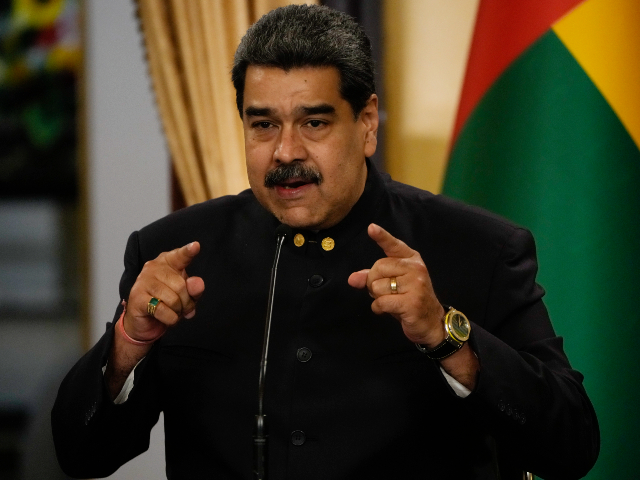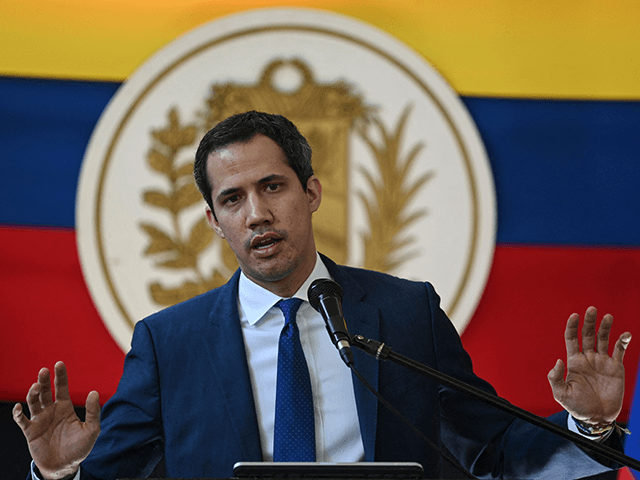CARACAS, Venezuela — With 72 votes in favor, 23 against, and nine abstentions, members of the Venezuelan opposition National Assembly overwhelmingly voted on Thursday to dissolve the nation’s legitimate interim government led by Juan Guaidó.
The vote effectively puts an expiration date on Guaidó’s presidency, which is now set to end on January 4, 2023. The dissolution proposal will go on to a second discussion to determine its fine aspects and procedures on a later undetermined date.
The corresponding debate session and its subsequent vote were originally scheduled to begin at 10:30 a.m. local time but began some odd minutes past noon with no explicit given reason as to why. The legislative session — which determined the fate of Guaidó’s interim presidency — was broadcast live via YouTube.
The lawmakers’ legislative session was held online via Zoom, which a significant percentage of the lawmakers appeared not to know how to properly operate and was riddled with video and audio issues that forced some of the lawmakers to cast their vote via text chat or through hand gestures. Additionally, an “opposition” lawmaker allegedly had his identity and vote supplanted by an imposter, according to Venezuelan news website La Patilla.
Some of the lawmakers that participated cast their votes from abroad as they no longer reside in Venezuela and have sought political asylum in other countries. Others still residing in Venezuela no longer have access to the Federal Legislative Palace, located in the center of Caracas, after the regime of dictator Nicolás Maduro ousted them via a sham legislative election held on December 2020. The National Assembly voting on Wednesday is separate from the regime-controlled lawmaking body now occupying that building, which never recognized Guaidó’s claim to the presidency.
As reported on Tuesday, a group composed of three of the four major Venezuelan self-described opposition political parties that are part of the Unitary Platform had demanded the end of Guaidó’s interim presidency, withdrawing their support for an upcoming vote that would seek to renew his status as president. Juan Guaidó became president of Venezuela through a constitutionally sound procedure in 2019, but as his status was interim, he needed it to be renewed annually.
Maduro’s refusal to step down after clinging to power via sham rigged presidential elections in 2018 prompted the then-opposition-led National Assembly to act in accordance with Venezuela’s constitution, choosing the head of the parliament at the time, Juan Guaidó, as interim president of Venezuela in 2019. The constitution allows the Assembly to choose a president if the previous one commits a “rupture in the democratic order.”

Venezuelan President Nicolas Maduro speaks during a signing ceremony with Guinea-Bissau President Umaro Sissoco Embalo, at the Miraflores Presidential Palace, in Caracas, Venezuela, Wednesday, Nov. 2, 2022. (AP Photo/Ariana Cubillos)
Guaidó’s legitimate government, despite being symbolic and unable to exert any power within Venezuela, had been recognized by the United States and 50 other countries, none of which recognized Maduro’s rule as legitimate. Once it is effectively dissolved, the Maduro regime will uncontestedly remain the sole ruler in the country.
The “opposition” lawmakers met online on Thursday to debate two proposals on what should happen to Guaidó’s interim government.
The first proposal — spearheaded by the Justice First, Democratic Action (a member of the Socialist International), and A New Era (also a member of the Socialist International) parties — called for the simple dissolution of Guaidó’s government. The proposal also asked for the continuity of the “opposition” National Assembly and would leave the protection and safeguarding of Venezuela’s frozen foreign assets in the hands of their corresponding boards or councils.
The second proposal, promoted by Popular Will (another member of the Socialist International) and other parties, called for renewing Guaidó’s interim government for an additional year. Guaidó was a member of Popular Will until 2020 when he resigned to focus on his role as interim president of Venezuela.
A third proposal, presented by “opposition” lawmaker Héctor Cordero, sought to reconcile both sides by placing the National Assembly in a permanent session to reach an agreement. The proposal was dismissed due to a lack of support.
The fate of Guaidó’s presidency would not have had any immediate impact in Venezuela either way as dictator Nicolás Maduro and the United Socialist Party of Venezuela have complete control of Venezuela and its institutions.
Moments after the voting was finished, Juan Guaidó commented on the matter via his personal Twitter account.
La Constitución y su art. 233 no son una opción o solo una estrategia, son un deber y lo seguiremos defendiendo. El pueblo nos eligió para ello.
No se trata de defender a una persona, sino a las herramientas que tenemos para proteger a los venezolanos, a ellos nos debemos.
— Juan Guaidó (@jguaido) December 22, 2022
“The Constitution and its article 233 [which allowed Guaidó to assume the interim presidency of Venezuela in 2019] are not an option or just a strategy, they are a must,” Guaidó wrote, “and we will continue to defend it. The people chose us for it. It is not about defending a person, but about the tools we have to protect Venezuelans, we owe it to them.”
Neither Maduro nor any member of the socialist regime has publicly commented on the outcome of Thursday’s vote at press time.
The “opposition” National Assembly, which notably did not vote to dissolve itself, will reconvene on December 29 to discuss matters pertaining to Venezuela’s frozen foreign assets currently under the custody of Guaidó’s interim presidency, as well as to discuss the ongoing “negotiations” with the Maduro regime towards holding “free and fair” elections in Venezuela.
Christian K. Caruzo is a Venezuelan writer and documents life under socialism. You can follow him on Twitter here.

COMMENTS
Please let us know if you're having issues with commenting.